Discussing death and dying:
taboo or not taboo?

Conversations about death and dying don’t happen enough as they can be difficult and upsetting.
Often people don’t feel comfortable talking to their loved ones about grief, care plans for later life, or how they want to be remembered when they die.
But Dr Laura King, Associate Professor in Modern British History, and Leeds-based artist and performance maker, Ellie Harrison, have found it’s not that people don’t want to talk about these subjects.
In fact, by working together to present historical stories about death creatively, they’ve found it’s quite the opposite.
“There’s a perception that in the last 100 years or so, as mortality rates have dropped, that dying has become taboo in Britain,” Laura explained.
“But, actually, we’ve found that people are very keen to talk about death, grief and remembering their loved ones. It’s just about finding the right spaces to allow them to get through their initial sense of discomfort around the topic.”
A chance encounter
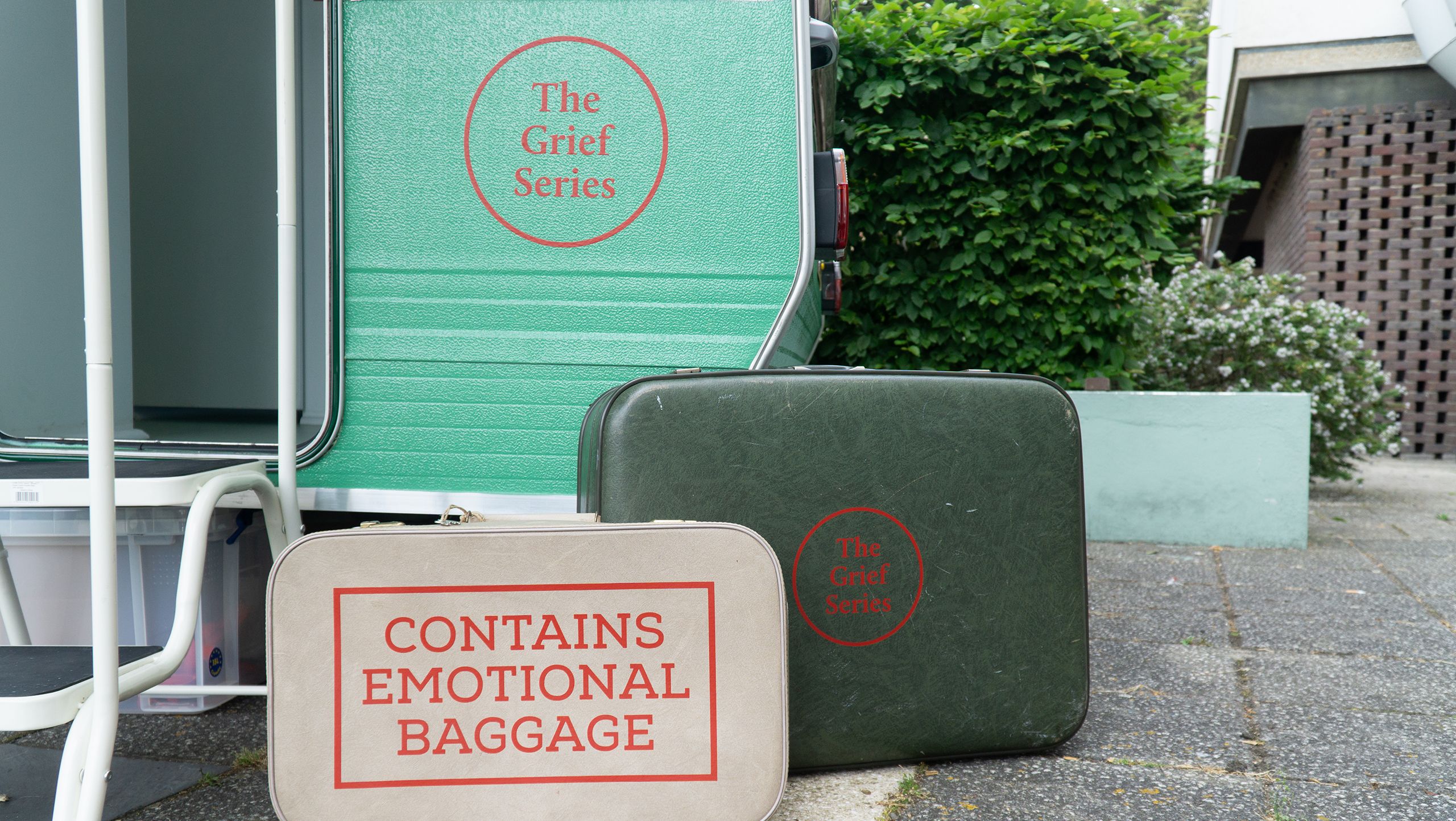
Laura and Ellie’s partnership began in 2014 when they met at a workshop and realised how much their work overlapped.
“I knew of Ellie’s work but I’d never met her so I was excited that she was at the event”, Laura said.
“She did a mini performance about emotion and grief and really disrupted the vibe of the room, which I thought was great. After we met, we started to work together on a couple of small public engagement events and built up from there.”
Laura has spent the last decade researching family life, fatherhood, childbirth and remembrance.
Through her Living with Dying research project, she explored the place of the dead in family life in the 20th century and asked what we can learn from that period to help us cope with death and dying in the present. She gathered stories from families about how they keep the memories of their loved ones alive through places, objects, and rituals.
Ellie, who had lost both parents and her brother by the time she was 21, is working on The Grief Series, a seven-part interactive body of work about grief.
It combines performance, design, photography, installation and sculpture in what Ellie describes as “an attempt to make the expression of grief less scary, for the bereaved and those supporting the bereaved”.
Laura and Ellie’s shared interest in the role of place and objects in remembrance practices led them to collaborate on part six of the Grief Series, ‘Journey with Absent Friends’, where they created a “mobile museum of grief” inside a vintage caravan.
They took the caravan on a month-long tour of the UK and Germany encouraging the public to talk about where their memories of their dead loved ones live.
Journey with Absent Friends
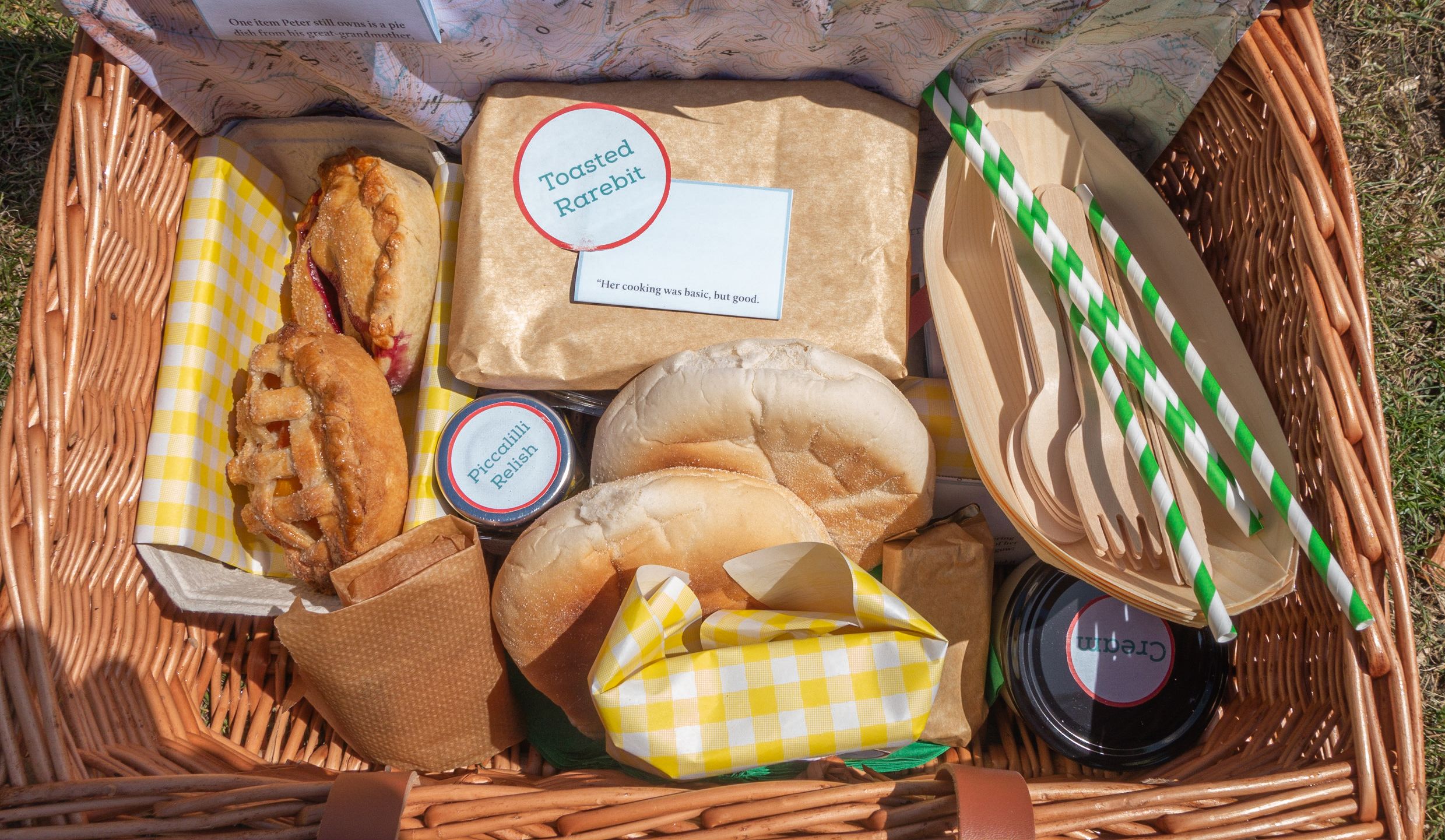
Laura and Ellie filled the caravan with audio clips and artwork to tell stories about death and remembrance from participants in Laura’s historical research and the members of the public they collaborated with.
For example, they worked with textile artist Hayley Mills-Styles to create embroidered baby clothes, housed in a drawer of unused blankets, to represent an experience of a mother who had lost her baby when she was just days old.
The caravan stopped at sites of personal significance for Ellie as well as museums, beer gardens and service stations.
Laura’s favourite stop was at Kirkstall Abbey, where they created a picnic with Leeds restaurant, The Swine that Dines, to explore the role food and drink play in remembrance practices.
“Each picnic item represented a story about commemoration from my research,” Laura explained.
“For example, we made a bottle of elderflower champagne and attached a label to it telling the story of a man who makes elderflower champagne every year in honour of his aunt.”
“We’ve found that people do all sorts of creative things to remember their loved ones and even the most mundane items, like clothes pegs, can become really significant when someone dies.”
Laura and Ellie encouraged visitors to engage with the historical stories then add a pin to a map in the caravan to indicate the places they associated with memories of their own loved ones.
If participants wanted to talk about their memories, they could, and facilitators were on hand to provide support and tissues if needed.
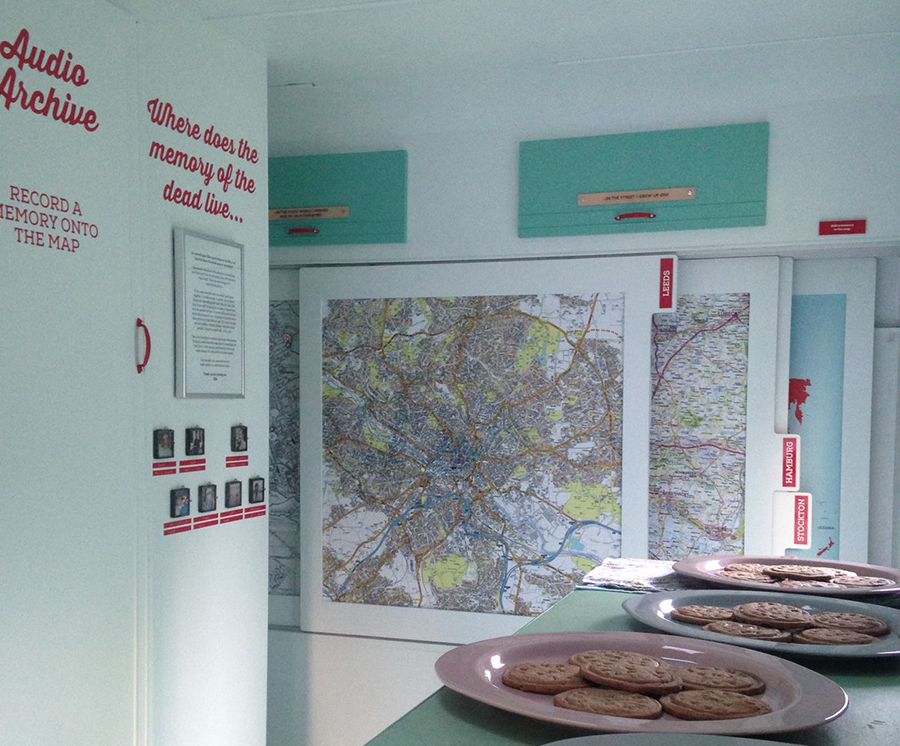
Maps and displays inside the caravan. Image credit: Matt Rogers
Maps and displays inside the caravan. Image credit: Matt Rogers
They found that the caravan provided an easier, or more neutral, way of prompting people to talk about death, grief and remembrance. Ellie described it as “an emotional safety ramp into a difficult topic” and Laura explained:
“Presenting stories from the past in an artistic way is less confrontational than saying ‘come and speak to us about your experiences of death.’ One man came up to us to admire the paint job on the caravan then segued into talking about his memories of caravan holidays with his late wife.”
The value of collaboration
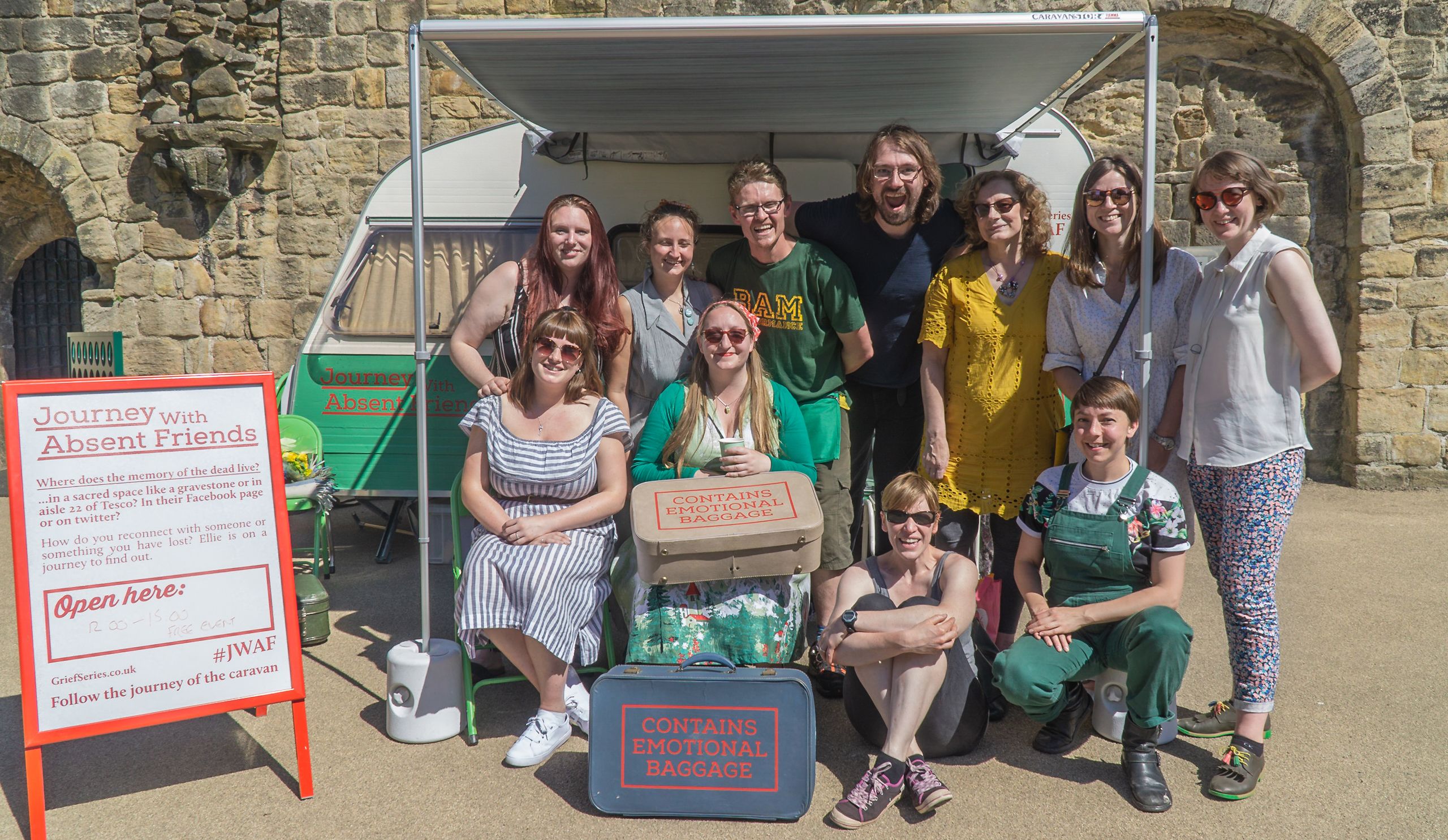
Combining historical research and art has been a two-way learning experience for Ellie and Laura.
“Ellie communicates in a different way to me”, Laura explained. “I never would have thought to bring my research to life through a picnic for ‘Journey with Absent Friends’. The focus on meals and remembrance took my research in new directions.”
Ellie spoke of the value Laura’s research has brought to her craft, saying: “Artists may be good at talking to people, but without access to research, how do we place our experiences in a broader context?”
Collaborating also allowed their work to reach new audiences. “The ‘Journey with Absent Friends’ took history and art away from institutions and into communities,” Ellie explained.
“It enabled us to hear different voices and show visitors that their experiences matter. Not all of the caravan’s audiences would have visited a history exhibition in a traditional venue, but they were all happy to engage with history and discuss it.”
Cross-sector conversations
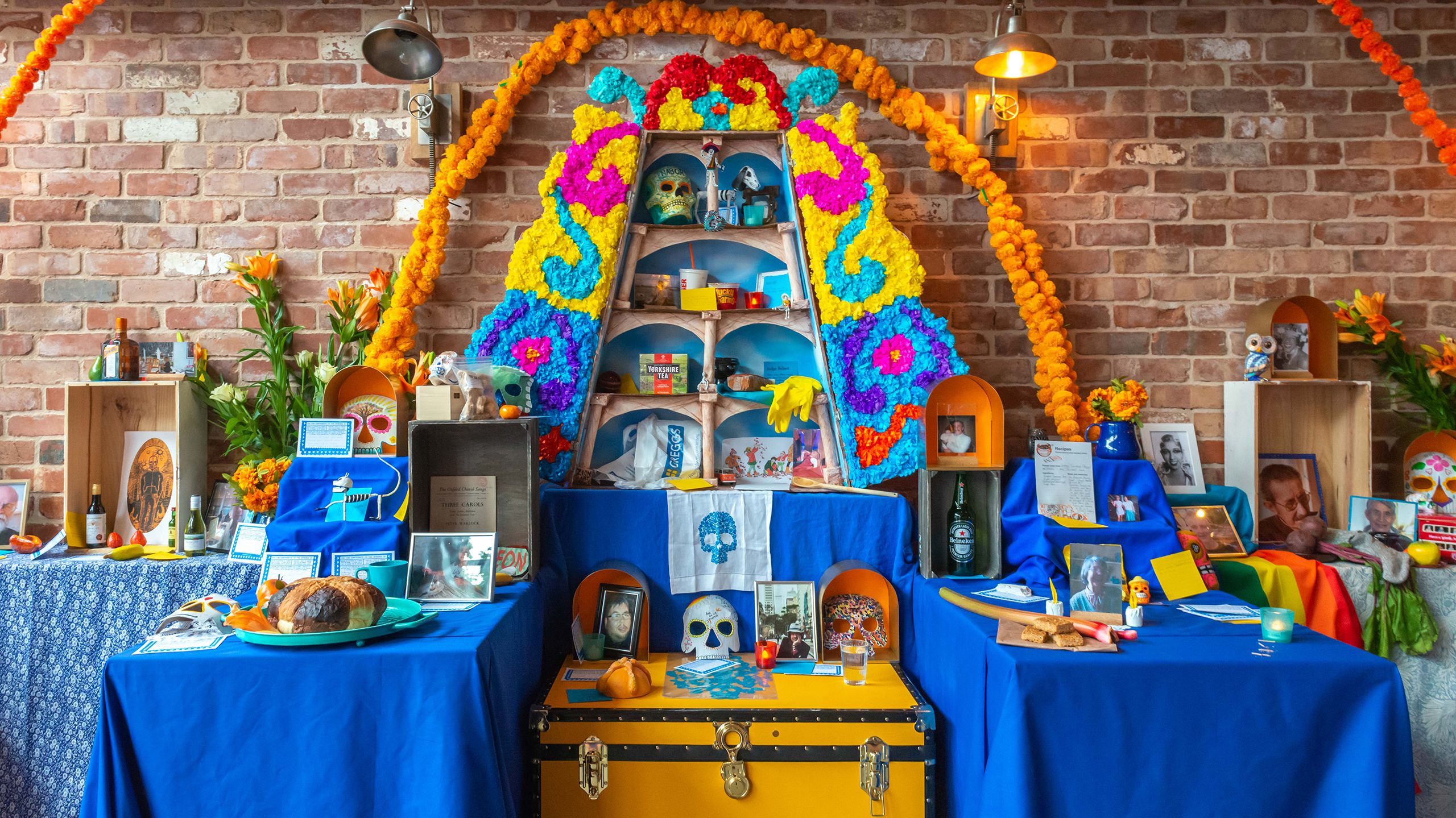
Laura and Ellie are still collaborating today and have joined forces on many more public engagement projects since the success of ‘Journey with Absent Friends’.
As part of an ongoing collaboration with Zion Art Studio – a group of Mexican artists – they ran British Academy-funded workshops that explored the differences between remembrance rituals in Mexico and Yorkshire and helped people in Leeds commemorate their loved ones by building ‘ofrenda’ – colourful Day of the Dead shrines.
Ellie will be exploring these rituals further in the final instalment of The Grief Series ‘All that Lives’. The exhibition will “re-imagine the Day of the Dead with the people of Yorkshire” and be a key part of LEEDS 2023, the city’s year-long celebration of culture.
Laura hopes their work will continue to spark conversations about death, both locally and internationally:
“Leeds is a really interesting city for cross-sector discussions around death and dying,” she said.
“We both sit on the Leeds Dying Matters Partnership, a group that brings together those interested in the subject from a range of sectors, including museums, hospices, care homes, and funeral directors, to share ideas, improve our practices and influence policies in this area.”
“I hope that all of our work encourages people to make plans for when they die and makes it easier for them to have conversations with relatives and friends about how they want to be remembered.”
About Laura
Dr Laura King is an Associate Professor in Modern British History in the School of History. Her research focuses on the social and cultural history of everyday family life, emotional relationships and the life cycle in modern Britain.
Her Living with Dying project explored the cultures of death in family life in 20th century Britain and how families remember the dead after they are gone. She is currently writing a book on families’ everyday remembrance practices.
Laura’s work reflects her interest in collaborating with partners and audiences outside of academia, from museums and artists to family historians and community groups.
She is Deputy Director of History & Policy, an accessible online resource that creates opportunities for historians, policy makers and journalists to connect with and learn from each other.
About Ellie
Ellie Harrison is a performance maker and artist living in Leeds and working internationally. She creates a range of solo and collaborative performance work for studios, galleries and public spaces.
Her work is often characterised by a playful and provocative approach to difficult topics, encouraging audiences to make decisions and participate.
Since 2010, Ellie has been exploring grief through The Grief Series. In 2015, she won a Love Arts award for her work on this project and spoke about it on Radio 4's Women’s Hour.
The Grief Series will culminate in November 2023 with ‘All that Lives’, an exhibition for LEEDS 2023.